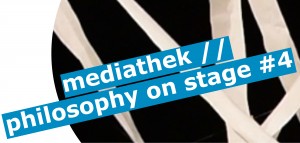Paulo de Assis / Michael Schwab / Collective ME21: Nietzsche6: The Weight of Music
Performance by Collective ME21, Paulo de Assis [CV] and Michael Schwab [CV]
Abstract
Between 1854 and 1874 Friedrich Nietzsche composed a substantial number of musical works, including fragmentary pieces for solo piano, several songs and even a sketched opera. His activity as a composer remains essentially unknown and his music pieces are rarely performed. Moreover, they are usually considered, in the best case, as juvenilia. Indeed, when Nietzsche decided to be first a philologist, then a philosopher, he stopped composing music. However, and beyond aesthetical judgments, his musical compositions disclose a character and a personality quite different from the far better-known Nietzsche-the-philosopher. Nietzsche-the-composer understands himself as a “medium”, an agent dominated by transcendent powers of inspiration and creation submitting him to pre-existing values; whereas Nietzsche-the-philosopher was a destabilising constructor, the inventor of new images of thought, the active operator of a fundamental redefinition of values. For Nietzsche music had the problematic potential of carrying an “oppressive weight”—an expression he openly used to refer to one of his compositions, and, later on, to Wagner’s music in general. A weight he increasingly associated with the idea of “swimming”, to which he proactively opposed the notion of “dancing”. In this performance, the Collective ME21, presents musical works by Nietzsche in dialogue with fragments of his texts, exposing some of the tensions between Nietzsche-the-composer and Nietzsche-the-philosopher.
Collective ME21
Paulo de Assis, concept and piano
Michael Schwab, text and voice
Marlene Monteiro Freitas, dancer
Valentin Gloor, voice
Juan Parra C., live electronics
Lucia D’Errico, lights and video projection
Performance Text Online
The year is 2015. It is 129 years since Nietzsche wrote this Attempt at Self-Criticism, 126 years since he stopped writing, and 115 years since he stopped living altogether. To understand what 129 years mean in the history of thought, we could go back a further 129 years before 1886 to the year 1757, which is thirty-two years before the French Revolution, twenty-four years before Kant published his first Critique, and forty-one years before the first issue of the Athenaeum was published. However, 1757 is seven years after Baumgarten’s Aesthetica, which announced the possibility that art could, one day, matter epistemically, albeit not quite in a manner we can recognise. The year is 2015. What has been called ‘practice-led research’, ‘art research’, or ‘artistic research’, and what many call ‘nothing at all’ is a fact: >>>
PDF Download
download PDF here
PDF Download of Stage Plan
download PDF here
IMPRESSUM
Led by Arno Böhler, the PEEK-Projekt „Artist Philosophers. Philosophy AS Arts-Based-Research“ [AR275-G21] is funded by the Austrian Science Fund (FWF) as part of the programme for artistic development and investigation (PEEK). Research location: University of Applied Arts Vienna. Brought about in national and international cooperation with: Jens Badura (HdK Zürich), Laura Cull (University of Surrey), Susanne Valerie Granzer (Universität für Musik und darstellende Kunst Wien/Max Reinhardt Seminar), Walter Heun (Tanzquartier Wien), Alice Lagaay (Zeppelin Universität Friedrichshafen). Postdoc: Elisabeth Schäfer (University of Applied Arts Vienna). The lecture series was produced in collaboration with: Institut für Philosophie Universität Wien, University of Applied Arts Vienna [Arno Böhler] and Institut für Theater- Film- und Medienwissenschaft der Universität Wien [Krassimira Kruschkova].
Our mailing address is:
FWF PEEK-Project „Artist-Philosophers. Philosophy AS Arts-Based-Research“ [AR 275-G21]
Universität für angewandte Kunst
Oskar-Kokoschka-Platz 2
A-1010 Wien
Subscribe to our mailing list
Comments are closed.

